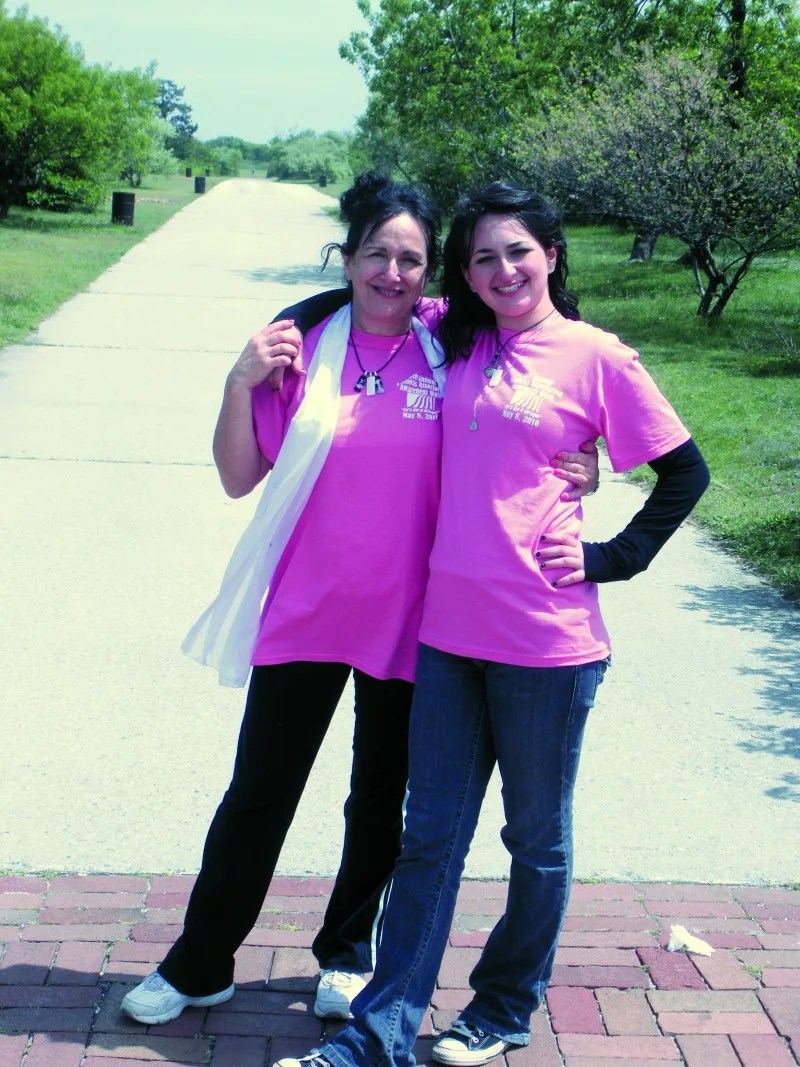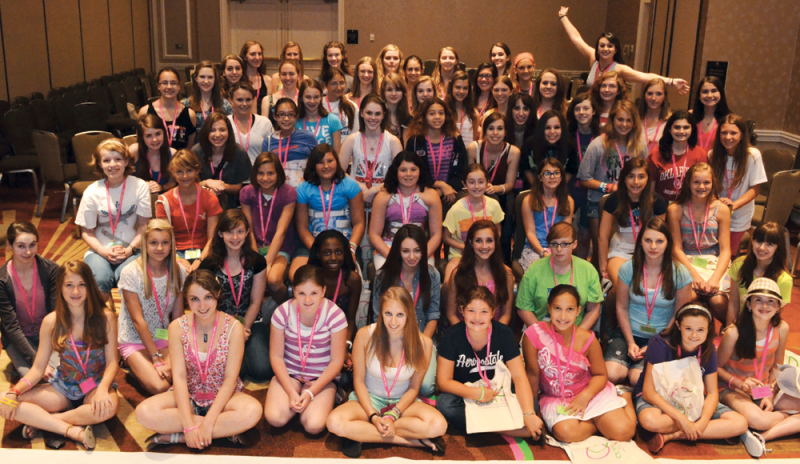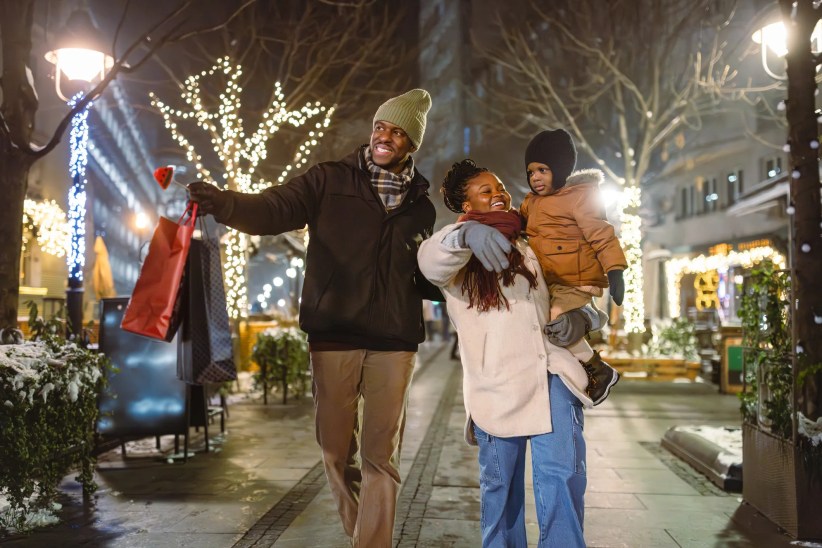Curvy Girls, a network of scoliosis support groups, empowers girls who have scoliosis from Long Island to Australia. The groups, founded by a Long Island-based mother-daughter duo, offers support and information for both girls and parents.
Leah Stoltz was 11 when she was diagnosed with adolescent idiopathic scoliosis, a curvature of her spine. The doctor told Stoltz she would have to wear a plastic brace to keep her spine from curving more. It was her first year of middle school, when girls are already easily embarrassed and feeling insecure. The fact that she now had to wear a cumbersome, visible brace nearly 23 hours a day made Leah feel hopeless.
“I felt like I had lost control of my body,” says Stoltz, a Smithtown native who is now a senior at American University in Washington, D.C., studying business. “I had no idea what the brace would look like, and I remember that first day being so uncomfortable with the way I looked. I wanted new clothes to hide the brace, but I didn’t want to go to the mall where all my friends might be. I didn’t want to look uncool.”
But more than that, Stoltz says, she felt like she had no one to talk to, no one who understood what she was going through. With the encouragement of her mother, Robin Stoltz, she started a group for other girls on Long Island who have scoliosis. Stoltz handed out flyers at her orthotist’s office and formed her first group in 2006. She decided to name it Curvy Girls.
An Emotional Brace
|
Leah Stoltz (right) and mom Robin Stoltz founded the Curvy Girls network after Leah was diagnosed with scoliosis. Courtesy Robin Stoltz |
According to the group’s site, curvygirlsscoliosis.com, Curvy Girls is a network of peer-led support groups that reduce the emotional impact of scoliosis by empowering girls through mutual support and acceptance to become leaders, make healthy lifestyle choices, and improve self-esteem.
Each meeting has a separate group for the girls and another for their parents, because Stoltz realized the girls’ moms needed others to talk to as well. Robin Stoltz, a clinical social worker, says parents came to their house in Smithtown for the first monthly meeting. Although the organization has grown quite a bit since then, what remains constant is the need for both the girls and their parents to connect with others who understand what they are going through.
Curvy Girls got national attention in 2009 when Stoltz, then a senior at Smithtown High School West, was surprised during a school pep rally by Nick Cannon, who presented her with a Helping and Leading Others (HALO) award courtesy of Nickelodeon. As a result of the publicity that followed the award, Stoltz and her mother started the website curvygirlsscoliosis.com. Curvy Girls now has 55 groups in countries across the world, including Australia, Brazil, and Canada.
Though Leah is away at college, Robin Stoltz and parent advocate Theresa Mulvaney of Mount Sinai continue to run the Long Island group in the Stoltz home. Robin says that parents have brought their girls from as far away as Pennsylvania.
Help Beyond Diagnosis
|
Last year, Curvy Girls held its first international convention in Hauppauge, which drew 150 girls and their parents. The next is scheduled for June 29-July 1, 2014. Courtesy Robin Stoltz |
Meanwhile, Curvy Girls has another new project: Straight Talk with the Curvy Girls: Scoliosis—Brace Yourself for What You Need to Know ($21.95; straighttalkscoliosis.com). The book was compiled by Robin Stoltz and Theresa Mulvaney, whose daughter Rachel was one of the attendees of that first Curvy Girls meeting. Sections of the book include moving personal stories of girls and their mothers, fashion issues, messages from the girls, parent resources, and medical and psychological information.
“All the parents we meet always say the same thing about their children’s care: ‘Why didn’t we know this?’” Robin Stoltz says. “There are so many aspects to this condition that parents and kids are just not told upon diagnosis, so we wanted to make it available in this book.”
For example, she says, the standard care for scoliosis is to put a child in a brace, and if that doesn’t work the doctor recommends spine surgery—as was the case for Leah after more than two years of wearing the brace. But Mulvaney learned about the Schroth method of physical therapy, which she says was successful for her daughter Rachel.
“After five years of suffering with chronic back pain, Rachel was pain-free and [the therapy] decreased her curve 12 degrees in eight months,” Mulvaney says.
Her mother now advocates for other girls to explore the Schroth method as well. “There is so much parents need to know, and the information wasn’t out there,” Mulvaney says. “For instance, we learned it matters how the brace is made. The brace is not supposed to hurt. If your child complains of pain, parents need to know that’s not normal. Also, it’s so important that the person working with your child knows how to relate to your child.”
Stoltz and Mulvaney published Straight Talk with the Curvy Girls in June. “If we can get to a new parent early on, they won’t have to make the mistakes we made,” Mulvaney says. You can do everything right, and your child may still need surgery. But we want to give them a fighting chance.”
Growing Support
Curvy Girls came from Leah Stoltz’s loneliness about her diagnosis more than seven years ago. “I didn’t start out to create a support group,” she says. “I just needed to find others to talk to. Curvy Girls became a community. When you’re diagnosed, you need much more than doctor visits because there’s so much emotion there. Our group is an emotional brace.”
And the group continues to grow. Rachel Voorhees, 20, a student at Adelphi University in Garden City, was 12 when she was diagnosed and 19 when she had back surgery. She then started a Curvy Girls chapter in her hometown of Walden.
“Curvy Girls has completely changed the way I view my condition,” Voorhees says. “It’s no longer a negative in my life, but rather a positive that has allowed me to meet so many wonderful girls that I probably wouldn’t have met otherwise. It’s comforting to know that I have so many people to turn to with any questions or concerns. They understand me better than anyone else can when it comes to my scoliosis. I also love being able to offer advice to girls who are newly diagnosed or are thinking of having surgery.”





















